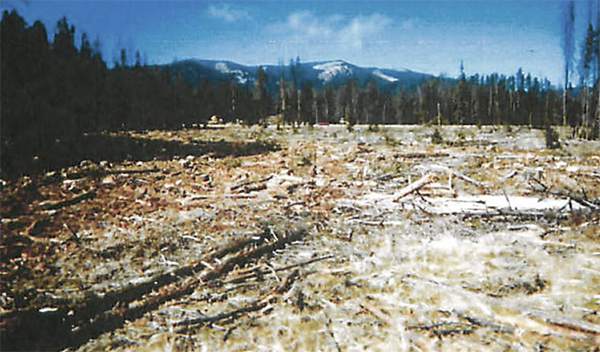by Laura Lundquist
Originally published here.
A federal judge halted a timber project Friday because the Forest Service might have overstepped its bounds in bypassing the public process.
On Friday, Missoula federal District Judge Donald Molloy put a hold on the Moosehorn Ditch Salvage Timber Sale in time to halt logging scheduled to begin on Aug. 1. In so doing, he gave attorneys for the Alliance for the Wild Rockies and Native Ecosystem Council time to press their lawsuit that the Beaverhead Deerlodge National Forest approved a timber sale without going through a public process as required by law.
The judge wrote that the environmental attorneys raised enough valid questions that “the balance of equities tips in favor of Alliance because it faces permanent damage if logging activity were to proceed and the Forest Service faces only delay.”
AWR executive director Mike Garrity praised the judge’s decision, saying if the Forest Service had been allowed to log the rest of the 845 acres in the timber sale southwest of Wisdom, the agency could have argued the lawsuit was moot with no logging left to stop.
The environmental groups filed their lawsuit in March after NEC Director Sara Jane Johnson, a former Forest Service wildlife biologist, stumbled upon a large clearcut while visiting the area to monitor some aspen livestock-fencing projects. “The area looked like it had been hit by a nuclear bomb,” Johnson said in a release.
Johnson then asked the Forest Service for documents on the timber sale’s public process and was told there had been no public process. Johnson was told the logging was “routine maintenance consisting of removal of hazard trees along private linear right-of-way.” Managed by Jack Hirschy Livestock, Inc., the Moosehorn Ditch flows along a narrow easement through the national forest.
Garrity said he had no problem with Hirschy cutting trees adjacent to the ditch within the easement.
But the clearcutting Johnson found broached Forest Service land, extending 150 feet or more on either side of the ditch, according to what agency attorneys told Molloy on Thursday. The agency should have put the off-easement timber sale out to public comment, Garrity said.
The Forest Service initially announced the sale in March 2014, and logging was supposed to occur from March 24 into May 2014. The reason why the logging was delayed until recently is unknown. The Forest Service cannot comment on projects under litigation.
Agency attorneys said the Forest Service created the timber sale because Hirschy had started cutting trees on his own. The agency had the rancher sign a contract to have the Forest Service handle the $10,000 timber sale because it is on public land. Agency attorneys told Molloy if they had to put such timber sales out to public comment, the process would be too hard and other ranchers wouldn’t sign similar contracts.
Because Hirschy plays such a large role in this incident, Molloy added him as a defendant in the case. Garrity said if Hirschy had logged and sold the trees himself, the rancher would have been stealing.
So why oppose logging along a ditch easement? Because it has ramifications throughout many western forests.
Particularly in a headwaters state like Montana, miles of agricultural ditch funnel stream water along easements through national forests to private property. The Forest Service doesn’t have a ready tally of all the ditches, but a Beaverhead Deerlodge ranger said between 20 and 100 miles of ditch run through his district.
If all ditch managers were allowed to clearcut 150 feet to either side of their ditches, the forest could become more fragmented, and that doesn’t bode well for wildlife. Species such as grizzly bears, lynx and wolverines could be negatively affected.
Johnson said goshawks, wolverines, sage grouse, Northern Rockies fishers, gray wolves, black-backed woodpeckers, pileated woodpeckers, northern bog lemmings, Brewer’s sparrows and great gray owls have all been documented in the Moosehorn Ditch area.
Garrity said the lawsuit didn’t oppose the timber sale per se; it seeks to require the Forest Service to follow the National Environmental Policy Act and allow the public to know and weigh in before moving forward with such a project.
Molloy appeared to give credence to the environmental groups’ arguments when he wrote:
“In reviewing the parties’ arguments, the outcome of this case will likely turn on the definition of “ditch maintenance” and whether the Forest Service acted arbitrarily and capriciously in determining that the logging activity provided for in the Timber Sale fell within that definition. Alliance raises serious questions on the merits as to both issues.”
With the injunction in place, the lawsuit will now slowly move forward.
